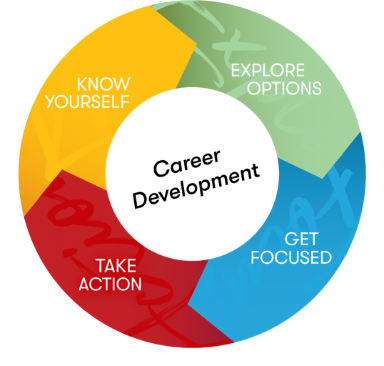Owning Your Career Development
Making Your Career Count
As children, many of us are asked: "What do you want to be when you grow up?"
This suggests that, even at a young age, we should be ready to commit to a career path. For most people, their first companies or jobs are not what they will pursue for most of their career. In fact, according to the US Bureau of Labor Statistics, most people hold an average of 12 jobs in a lifetime.
So, it’s important to remember that the aim is not to find the perfect internship or job you will have forever. Instead, the aim is to build skills, experiences, and a network that will help you thrive in the long term.
💡 The purpose of the professional development modules are to give you the skills to craft a meaningful career.
You’re More Ready Than You Think
📺 How does one craft a meaningful career? Read or listen to the tome below for a perspective from Reid Hoffman, serial entrepreneur/investor and founder of LinkedIn
Click this link to access the tome
Reflect: You’re More Ready Than You Think
Share your thoughts in Slack.
What is Career Development?
Hoffman describes a common experience that many people have after university. He thought he wanted to study philosophy, began a graduate program, then realized it was not the right path. This experience — of one’s first job not being the right fit — is quite common. When it happens, the first instinct is fear or worry about having made the wrong career choice. But, as we’ll learn throughout this course, choosing one’s career is not a one-time decision. Having many jobs roles or functions is a normal part of career development.
Before defining what career development is, let’s start with what it is not. There are a lot of misconceptions about what it takes to craft a rewarding career. For starters, career development is not:
- Deciding what you want to do for the rest of your life
- Applying for or getting a job
- Creating a rigid timeline and/or defined job progression for your career
💡 Career development is a lifelong, intentional process of managing one’s work and learning experiences. It involves continuously exploring, experiencing, and evaluating professional opportunities.

The illustration above breaks the career development cycle into four parts. Before we delve into each part, note that the image is cyclical. As the definition states, career development is a lifelong process that involves continuous action. The career development cycle includes:
- Know yourself: developing self-awareness and honestly assessing your interests, skills and values
- Explore options: understanding the workforce, market realities, and your opportunities to contribute
- Get focused: selecting specific goals to drive your action
- Take action: gaining experience and reflecting on that experience so that you can deepen your self-awareness
Four Ideas to Guide Career Development
By the end of this training course, we hope you will agree with four key claims.
1️⃣ Career success is a journey, not a single destination
Getting a job is a step towards building a career, not the ultimate goal. A successful career is an ongoing process marked by continuous adaptation.
2️⃣ Knowing yourself is the beginning of career wisdom
To achieve career wisdom, you must first know yourself. A fulfilling career is informed by a deep understanding of your values, interests, strengths, and weaknesses.
3️⃣ Your professional network will power future opportunities
Building and nurturing a strong professional network is crucial. Your network will be a source of opportunities, collaboration, and knowledge sharing. The connections you cultivate, starting with your peers, will significantly influence your professional growth and success.
3️⃣ Experience is the best teacher
In the early stages of your career, prioritize gaining diverse and relevant experiences. Actively seek opportunities that allow you to develop skills, explore different roles, and build a strong foundation for future career growth. As Hoffman notes, “In the world of work, you don’t know what the best plan is until you try.”
In the next lesson, we'll begin to explore how to deepen your self-awareness for career success.